Sweden’s Tryst with India
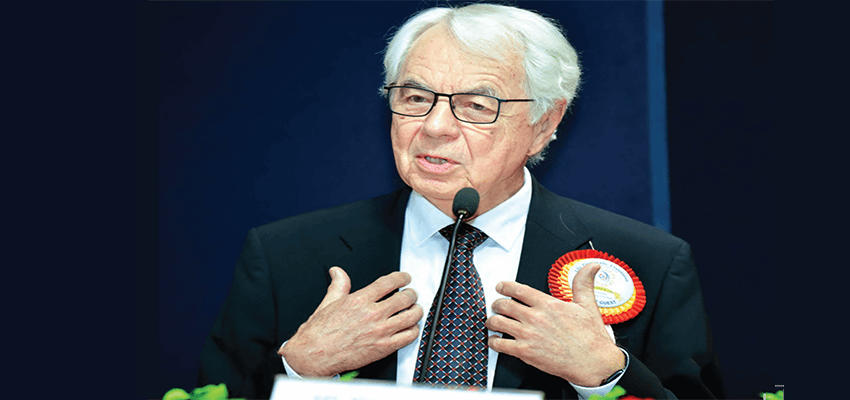
Göran Grosskopf whose tryst with India began in Pune as the head honcho of Tetra Laval in the 1970s, has had an impressive corporate journey around the globe, which also includes a stint with IKEA, Sweden’s globally popular furniture store.
Göran Grosskopf, a Swedish national, who has been the head of 19 different companies, currently holds the position of Chairman at Medicon Village AB, Chairman at Annehem Fastigheter AB, Chairman at Herenco AB, Chairman-Supervisory Board for IKEA AB, Chairman of Stefan Paulsson Invest AB, Chairman for Brainheart Energy AB and Member-Executive Board at SVOX AG. He is on the Board, in over a dozen companies.
His tenure in India for over a decade was in Pune as the Chairman of Tetra Laval International SA and Chairman for Tetra Laval AB (a subsidiary of Tetra Laval International SA), Chairman of Peab AB, Chairman for BergendahlsGruppen AB, Principal at Ernst & Young LLP (Missouri) and Chairman of Stichting INGKA Foundation. Groskopf who was on a visit to India recently, speaks at length to Corporate Citizen on his personal experiences and professional journey on the Indian soil
Corporate Citizen: Swedish multinational companies have made their mark in the industrial belt of Pune. What made Tetra Laval (before that Alfa Laval) to build their factories here?
Göran Grosskopf: Well, as you know, Global companies need to look globally on how to be efficient in their operations and India was attractive to establish production because there were skilled labourers and much lower labour costs. Also the salaries were low here compared to Sweden—with the Asian market growing very large, the transport costs had to be considered and producing close to the market was also important. All these advantages together, made India an attractive proposition. Therefore, we established the Tetra Laval Group, which I chaired. We set up production in Pune. We set up production for agricultural equipment and due to low cost of production, it made economic sense to us.
CC: Multinational companies are very common now in India because of the IT sector, services sector and so on. But, when you came in, the Indian automobile industry was gaining dominance in Pune. How did you make a mark as an overseas enterprise?
Well, in a way, we were at an advantage because actually Tetrapak bought Alfa Laval and Alfa Laval had already earlier established production in Pune. So for us it was pretty natural to build from there. We learnt a lot from Alfa Laval on how to build a factory here. Alfa Laval was actually a listed company in India’s public exchange.
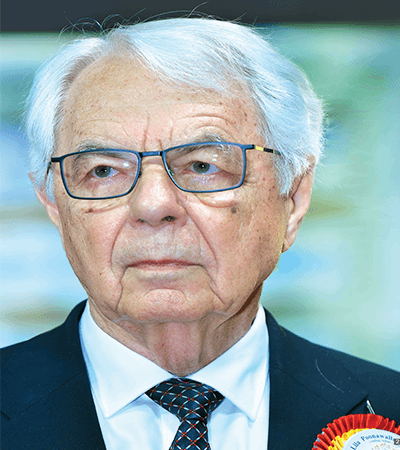
"India needs to adopt modern regulations. India must also have a modern and attractive tax regime and corporate legislations. So, in parallel with good conditions and a favourable environment, you need to come out of a conservative approach which creates hurdles for multinational investors. "
—Göran Grosskopf
CC: What was your experience of employing local employees?
I think that first of all, my seasoned experience is that you need to spend some time to understand the culture of any country where you are establishing production or business. And we took some time before we understood that, because we were trying to implement some Swedish factory culture which was completely alien to the employees here. Just to give you one example, we thought that it was too warm in the factories because of the tropical climate in India. So we installed air conditioning because we wanted the environment to be like in the western world with a good in-house climate. However, soon all the workers developed throat infections, got colds and so on as they were not used to. So we had to go back on our decision and remove the controlled settings.
That’s only one small thing, but you need to be very cautious. That goes not only for India. Wherever you go, you need to spend some time in order to become a successful glocal entity, which encompasses a comprehensive strategy, keeping the local culture in mind.
CC: So would you say as far as diligence or hard work is concerned, Indian employees out perform those in Sweden?
The experience of Indian employees is that, first of all, they have a good basic education. Even if a lot of them are working on the floor and don’t have more than a basic education, still they are skilled in what they are doing with their hands and they are loyal. We have had very good experience from the workforce.
CC: So how many years were you here in Pune, India?
Well, I was the Chairman and CEO of the group from 1993 to 2003. I was also on the board of Alfa Laval, so I used to visit India five to six times in a year during this tenure.
CC: India is completely opened up and is one of the most attractive nations for investment. What are your observations in this regard?
It’s true that India has opened up. I was the Chairman of IKEA, when we decided to establish the first mall in Hyderabad, a few years back. Even if we could establish our own company, it was mandatory for us to have a certain percentage of local production. So even if it’s opened up, there are still certain rules and regulations you need to comply with. I understand that you want to protect, your country and the production, but the multinationals do not really like too many regulations. And, I think that is one key element for India to introspect. After the Covid-19 pandemic, a lot of production has moved into India because China has been closed and Multinationals are looking for alternatives. Here, the energy costs are reasonable because of your agreement with Russia on oil and gas. From that perspective, the conditions are very good, but India needs to adopt modern regulations. India must also have a modern and attractive tax regime and corporate legislations. So, in parallel with good conditions and a favourable environment, you need to come out of a conservative approach which creates hurdles for multinational investors.
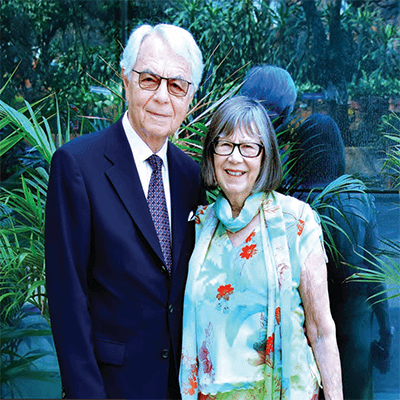 Göran Grosskopf, with wife, Birgita
Göran Grosskopf, with wife, Birgita
Every day is a new day and there is always something you can do and the most satisfactory is when you can do something which helps the society. Every day you can’t do it, but when it happens, you feel a sense of satisfaction
CC: Do you think that’s the reason why countries like Vietnam are getting more response from multinationals than India?
Vietnam has good labour forces and they have been working hard to build reasonable conditions for multinationals and they have got a good response. If I look at IKEA, for example, we produced a lot in Vietnam already, since 20 years. And, Vietnam is close to China as well, so it’s easy also to recruit certain key people from China into Vietnam.
CC: So now, do you still have major production of Ikea in Vietnam?
IKEA has production in so many countries now. We had huge production in Russia for example, which now has lot of problems due to the Russia-Ukraine War. We have production in India as well and already had that before the stores were open. And, also in many countries in Europe, not the least in Sweden, and in the USA as well.
CC: Tell us about your association with IKEA?
It actually started when, the founder of IKEA decided to move out of Sweden. And that goes back to the unfavourable conditions for successful companies in Sweden in those years. We are talking about late 1970s. Entrepreneurs were fed up of the extremely high tax rates. For the individual, the wealth and the inheritance taxes too were spiralling. This was a sterling example of how unfavourable conditions can destroy the corporate climate, because of which Tetra Laval too moved out at the same time. In fact, a lot of successful Swedish companies moved out of the country. I was engaged in helping out IKEA in moving out of Sweden, where, at that point of time, I was associated with them on a consultancy basis and continued to have a close contact with them. When I left Tetra Laval, they wanted me to take on the chairmanship of IKEA, because I knew them since many years ago. We then established the Indian store in Hyderabad, India.
CC: How’s the Indian experience with all the traffic snarls and so on. Has it been cumbersome for your business?
From a European perspective, it looked absolutely terrible and crowded—that’s what you feel at the beginning. But, you know, when you are here, you understand that in one way or the other, it still works. We get the goods from one place to another and people can take goods from the store in one way or the other, so it works. It’s crowded but still it moves on. There is a system in the chaos.
CC: You are also associated with some philanthropic activities as well. Could you tell us about them?
I think that, today we look upon Philanthropy as some kind of obligation for wealthy people to participate in. I don’t think philanthropy works, if you look upon it as an obligation. If it is a monetary obligation, then it is okay. To do social work, you need to be committed yourself. Having travelled the world so many times and seen so many poor people, my wife and I have realised that it’s much more than an obligation to help. You need to help. The world needs help. Social welfare can be built by politicians, but it never reaches out to everyone. And that’s why you need to be there to contribute, if you can.
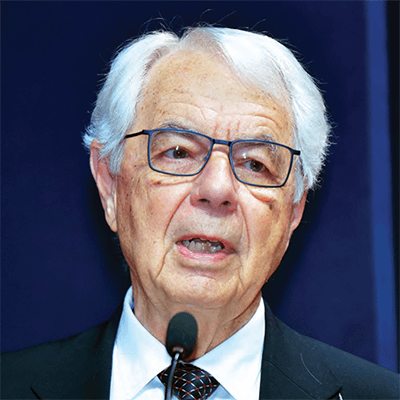
"The experience of Indian employees is that, first of all, they have a good basic education. Even if a lot of them are working on the floor and don’t have more than a basic education, still they are skilled in what they are doing with their hands and they are loyal. We have had very good experience from the workforce"
CC: Which social organisations are you associated with?
In Pune I am associated with Lila Poonawalla Foundation, which is doing fabulous work in enhancing girls’ education. Lila and Firoz Poonawalla are my dear friends. It’s admirable how they have uplifted the status of not only the girl scholars who they give scholarships to at the school, undergraduate and post graduate level, but also their families. The LPF foundation looks at the overall development of the girl scholar, which has fetched great results for the Foundation. I had helped Lila and Firoz established the foundation and so this cause is very dear to me. Today, it has already provided scholarships to over 14,000 girls since its inception.
And then in 1995, we launched the Scripps Family Clinic in Pune, which is doing very well. I was so surprised to see in Google that many patients are benefitting from this clinic, which we started so many years ago. Recently, we inaugurated a small cancer screening clinic in the poor parts of Pune. I inaugurated the clinic and they already had 25 patients there, when we reached there. That’s been very rewarding.
I am now engaged in Swedish Charitable Foundations. Especially in the. Medical field, we are sponsoring the Swedish Medical Village and the Swiss Cancer Center. Right now, I’m heavily engaged in setting up a National Center for developing the new generation of cell and gene therapies. In the new pharmaceuticals, cell and gene therapies are gaining importance for cancer treatment. And, also the new corona vaccines are built on similar therapies. We need to understand that if we are to be successful then we need to establish really good, qualified centres to attract the best scientists.
CC: So as a Swedish, what do you think India needs to do to really stop that lopsided kind of a wealth equation?
First of all, you have to understand that, also in the Western world, in spite of all talks about equality and everyone being equal, there is a lot of poverty which is increasing very rapidly. It is very difficult for a lot of people as inflation rates are extremely high and unemployment has gone up. Partly due to Corona, but also due to too high labour costs. So production has been moved out. And there’s a lot to do in social welfare in the western world. And looking at how it is today in the western world, it has not been successful. They haven’t been able to take care of the old, poor people in the western world either. To your question about India, this is so difficult because first of all, I’ve been travelling to India for 35 years and there has been tremendous development. Many people have moved out of poverty. However, to continue that journey, I think that first of all you need to put a lot of effort to put all children into schools. Because a basic education—I’m not only talking of intellectual education or learning to write and read and so on, but also social education on hygiene, cleanliness. So literacy would elevate social hygiene and sanitation and public sanitation would heighten the upgradation of the whole society.
Yes, that is the basic and that will also make it easier to get production in the country, because all workers need a basic understanding of what’s important in life— understanding of hygiene and cleanliness to work in a factory. They can’t just throw the garbage on the floor of a factory and so on. So all these things go back to the social mind-set.
CC: What is the philosophy that you live by?
Every day is a new day and there is always something you can do and the most satisfactory is when you can do something which helps the society. Every day you can’t do it, but when it happens, you feel a sense of satisfaction.
CC: You have been married for how many years to Birgita? And so what is one advice you would give to young couples.
Well, we’ve been married for 43 years and you need to respect each other and care for each other’s needs. We have different needs, even if we’re married. Each of us need to satisfy our different needs. We need also to take care of each other and to take care of the family. The family as such is so important and I’m concerned about the western world where we have lost a little bit of the family. Yes, and part of the problem we see now, is young children going wayward. We see this phenomenon all over Europe now because we have lost the core of it all, which is the family and its value. India still has the family system and families still take care of each other. You should preserve this social heritage as it is so important for going forward, as an individual and as a nation.
Sweden–India: Investment, Technology and Trade linkages
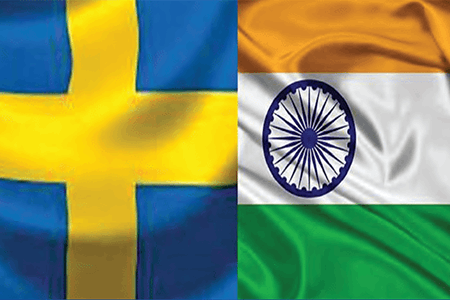
Swedish companies have a long record of manufacturing in India and rank among the top in Making in India. India - Sweden Trade and investment have grown rapidly in recent years. There is a growing Indian business presence in Sweden, especially in IT sector (around 50)
Swedish business
Sweden’s natural resources include iron, timber, fisheries and hydro power. Sweden has, therefore, focussed on manufacturing, IT, life sciences, circular economy, and clean technologies. Sweden has created an exemplary innovation ecosystem where it consistently ranks among the top two economies in the world. Sweden’s major industries include automotive, telecommunications, pharmaceuticals, industrial machines, precision equipment, chemical goods, home appliances, forestry, iron and steel. Many large businesses belong to the Wallenberg group – Ericsson (telecom), SEB (banking), SAAB (defence production), ABB (electrical equipment, automation), Electrolux (home appliances), SKF(bearings), Atlas Copco (industrial equipment, mining), AstraZeneca (pharma), Grand Hotel among others. Other leading Swedish companies and brands include: IKEA (furniture retail), H&M (clothing and interiors), Tetra Pak (packaging) Alfa Laval (heavy industry), BAE (defence), Volvo (automotive), Sandvik (engineering), Scania (automotive), Spotify and Truecaller (IT). Several innovations including safety match, seat belt, zipper, ultrasound, pacemaker, tetra pack, telephone handset, skype have Swedish roots.
India – Sweden Relations
India - Sweden Trade and investment have grown rapidly in recent years. Trade in goods and services has increased from USD 3 billion (2016) to USD 4.6 billion (2021). India is the 3rd largest trading partner for Sweden in Asia. The number of Swedish companies with business presence in India has increased from around 150 to around 250 in the last five years or so. The number of Indian companies with business presence has increased from around 50 to 75 over a similar period. Swedish business presence in India dates back more than a hundred years (Ericsson, Swedish Match Co., SKF, ABB) and has concentrated especially in Pune since 1960s. The next wave of investment followed over the last two decades, which has further picked up in the past five years.
Swedish companies are among the leading global players in several fields and are present in India in sectors including IT (Ericsson, Spotify, Truecaller), automobiles (Volvo, Scania), earth moving & mining (Alfa Laval, Scania), process plant equipment (Sandvik), electrical engg. & AI (ABB, SKF), pharmaceuticals (AstraZeneca), packaging (Tetra Pak) sustainable urban solutions (waste management, water, IT solutions), retail (IKEA, H&M), and defence (SAAB). Several Swedish SMEs are also active in India esp. in IT, renewable energy and manufacturing. Swedish companies have a long record of manufacturing in India and rank among the top in Make in India.
There is a growing Indian business presence in Sweden, especially in IT sector (around 50). Some Indian companies have also made acquisitions in recent years in Sweden (Bharat Forge, Wipro, Cadila Pharmaceuticals, Aditya Birla, Crompton Greaves, Altruist Technologies, HCL Technology etc.). Indian biotech and pharma companies including Dr. Reddys, Biocon, Kemwell and Cadila Pharma have formed collaborative relations in Sweden. Various mechanisms, established in recent years, including the India Sweden Business Round Table (ISBRT), Sweden India Business Council (SIBC), remained actively engaged in promoting business linkages, as did the entities such as Invest India, Business Sweden, CII, DPIIT, CII and India Sweden Healthcare Innovations Centre.
Embassy of India supports the organisation of an annual India Sweden Innovation Day. Sweden also hosts a Sweden India Nobel Memorial Week in India focusing on promoting business and academic linkages.
Around 8,500 business visas were issued to Swedish nationals during 2019
Research and Innovation Collaboration
Departments of S&T (DST)and Biotechnology (DBT), along with GITA (DST-CII collaboration) and ICMR from India are partnering Swedish agencies including Vinnova (Swedish Govt Innovation and R&D agency), Swedish Energy Agency, Swedish Research Council and FORTE (under Ministry of Health) to co-fund projects relating to research and industrial applications. The range of areas of cooperation include: Smart Cities & CleanTech, Nano Sciences, Computer Sciences, AI, Smart Grids, Energy Research (storage, e-mobility, new fuels), water, waste to wealth, circular economy, embedded systems, new technologies. Other areas include: Digitisation and Internet of Things (IOT), Health & Life Sciences, Biomedical Devices, Bio-Economy, Startups, Test Beds, Bioclusters, Digital Healthcare, Ageing, New materials, Space & Aeronautics etc.
Bilateral Institutional Cooperation Mechanism
A range of MoUs and bilateral Agreements exist covering sectors including Science & Technology; Healthcare,Sustainable Urban Development, Renewable Energy, Railways; Space, Polar Science, and Defence. There are a number of Joint Working Groups (JWG) established under many of these MoUs. There also exist agreements on avoidance of Double TaxationBilateral Investment Protection and Air Services.
The 19th session of Indo-Swedish Joint Commission for Economic, Industrial and Scientific Cooporation (JCEC) was held in Sweden in October 2019. Mid- term review of the Protocol of the 19th meeting of Indo-Swedish JCEC was held virtually in April 2021.
The 6th Meeting of India Sweden Joint Committee on Science & Technology was held in Sweden in May 2019. The 11thJWG on Health Cooperation was held in December 2020 in a virtual format. The Swedish side has proposed to hold the next JWG on Health. The 7th JWG on Defence Cooperation was held in Delhi in December 2018.
So far six rounds of Foreign Office Consultations have also been held. Foreign Office consultations on multilateral issues were held in January 2021 in virtual format.
Multilateral Engagement
India and Sweden jointly launched the Leadership Group on Industry Transition (LeadIT) in association with World Economic Forum (WEF) at the UN Climate Action Summit convened by the UN Secretary General in September 2019 in New York. The Stockholm Environment Institute is the Secretariat for the Lead IT whose membership has since expanded to 35 members including 16 countries (including France, Germany, RoK, UK and USA) and 19 big companies (including Dalmia Cement, Mahindra Group and Spice Jet).
At the first ever UN Conference on Human Environment that was hosted by Sweden in Stockholm in 1972, the Indian delegation was led by PM Indira Gandhi. Sweden will be co-hosting the Stockholm+50 with Kenya in early June 2022. In the 1980s India and Sweden worked together on nuclear disarmament issues within the framework of the ‘Six Nation Peace Summit’ (that also included Argentina, Greece, Mexico and Tanzania).
At the UN General Assembly, India and Sweden present an annual Joint Statement on Humanitarian Affairs. In 2013 during the Swedish Presidency, India joined the Arctic Council as an Observer at the Kiruna Ministerial Meeting. Both countries have, in the past, joined hands on common causes such as decolonisation, anti- apartheid promoting development partnerships, environment, UN Peacekeeping, UN Peace building and disarmament.